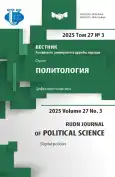Conceptual Framework for Enhancing Government-Citizen Engagement Amid Digital Transformation in Contemporary Russia
- Authors: Morozova S.S.1
-
Affiliations:
- Saint-Petersburg University
- Issue: Vol 27, No 3 (2025): Digital policies
- Pages: 638-653
- Section: DIGITAL TRANSFORMATION
- URL: https://journal-vniispk.ru/2313-1438/article/view/348841
- DOI: https://doi.org/10.22363/2313-1438-2025-27-3-638-653
- EDN: https://elibrary.ru/JKKOVG
- ID: 348841
Cite item
Full Text
Abstract
Optimizing government-citizen engagement amid Russia’s digital transformation requires a comprehensive approach that extends beyond technological solutions. To systematically analyze this issue, this study proposes and theoretically substantiates an integrative five- component conceptual model, which includes: technological infrastructure, an institutional and legal framework, mechanisms for civic participation, informational openness, and an environment of trust. The model’s validation, based on a series of expert focus groups with representatives from government, business, and the academic community, reveals a significant asymmetry in the development of its components. Despite technological progress, the research identifies a profound deficit of trust in the state’s digital initiatives, skepticism regarding the actual impact of e-participation mechanisms, and a weak dialogue between the authorities and society. The study argues that effective optimization is impossible without fundamental changes aimed at building trust, ensuring genuine citizen participation, increasing transparency, and improving institutions. Based on this analysis, practical recommendations for public policy are formulated.
About the authors
Svetlana S. Morozova
Saint-Petersburg University
Author for correspondence.
Email: s.s.morozova@spbu.ru
ORCID iD: 0000-0002-7069-7208
PhD in Political Sciences, Senior Researcher, Docent, Department of Russian Politics, School of Political Science
St Petersburg, Russian FederationReferences
- Alimov, E.V., & Pomazanskiy, A.E. (2020). Deliberative democracy: New challenges and opportunities in the information society. Journal of Foreign Legislation and Comparative Law, 83(4), 47–66. https://doi.org/10.12737/jflcl.2020.031 EDN: UWKRAR
- Alonso, S., Keane, J., & Merkel, W., (Eds.). (2011). The future of representative democracy. Cambridge University Press. Retrieved from https://assets.cambridge.org/97811070/03569/frontmatter/9781107003569_frontmatter.pdf
- Barber, B. (1995). Participatory democracy. In Encyclopedia of Democracy (vol. 3, p. 923). Routledge.
- Blumler, J.G., & Coleman, S. (2015). Democracy and the media — Revisited. Javnost — The Public, 22(2), 111–128. https://doi.org/10.1080/13183222.2015.1041226
- Coleman, S. (2018). Can the Internet strengthen democracy?. Aletheia.
- Dahl, R. (2000). On democracy. Aspent Press.
- Dobrinskaya, D.E., & Martynenko, T.S. (2019). Prospects for the Russian information society: Levels of the digital divide. RUDN Journal of Sociology, 19(1), 108–120. https://doi.org/10.22363/2313-2272-2019-19-1-108-120 EDN: VUHAGN
- Dunleavy, P., & Margetts, H. (2025). Data science, artificial intelligence and the third wave of digital era governance. Public Policy and Administration, 40(2), 185–214. https://doi.org/10.1177/09520767231198737
- Habermas, J. (2001). The inclusion of the other: Studies in political theory. Nauka.
- Malodia, S., Dhir, A., Mishra, M., & Bhatti, Z. (2021). Future of e-Government: An integrated conceptual framework. Technological Forecasting and Social Change, 173, 121102. https://doi.org/10.1016/j.techfore.2021.121102
- Mircică, N. (2020). Restoring public trust in digital platform operations: Machine learning algorithmic structuring of social media content. Review of Contemporary Philosophy, 19, 85–91. https://doi.org/10.22381/RCP1920209
- Morozova, S. (2024). Formation of a dynamic model for optimizing e-government in the Russian Federation under new challenges and risks. Political Expertise: POLITEX, 19(3), 415–430. https://doi.org/10.21638/spbu23.2023.304 EDN: HTLNOC
- Morozova, S.S. (2025). Digital dialogue: The role of social media and digital platforms in communication between the state and the citizen. Creative Economy, 19(1), 9–30. https://doi.org/10.18334/ce.19.1.122329 EDN: VJBIQK
- Nosonov, A.M. (2015). The theory of diffusion of innovations and the innovative development of Russian regions. Pskov Journal of Regional Studies, 23, 3–16. EDN: UWPERL
- Parkinson, J., & Mansbridge, J. (Eds.). (2012). Deliberative systems: Deliberative democracy at the large scale. Cambridge University Press. Retrieved from https://voidnetwork.gr/wp-content/uploads/2016/09/Deliberative-Systems-by-John-Parkinson-and-Jane-J-Mansbridge.-.pdf
- Pateman, C. (2012). Participatory democracy revisited. Perspectives on Politics, 10(1), 7–19.
- Rogers, E., Singhal, A., & Quinlan, M. (2019). Diffusion of innovations. In An integrated approach to communication theory and research (3rd ed., pp. 415–433). Routledge. https://doi.org/10.4324/9780203710753-35
- Sassen, S. (2002). Towards a sociology of information technology. Current Sociology, 50(3), 365–388. https://doi.org/10.1177/0011392102050003005
- Shchekotin, E.V. (2020). Digital technologies in the social sciences: The subject and method of digital sociology. Sociology and Law, 1(47), 49–59. https://doi.org/10.35854/2219-6242-2020-1-49-59 EDN: EVEDKP
- Smorgunov, L.V. (2019). Participatory public governability: Platforms and cooperation. Power, 27(5), 9–19. https://doi.org/10.31171/vlast.v27i5.6712 EDN: ULUOEO
- Van Dijk, J. (2012). The evolution of the digital divide: The digital divide turns to inequality of skills and usage. In Digital enlightenment yearbook 2012 (pp. 57–75). IOS Press. https://doi.org/10.3233/978-1-61499-057-4-57
- Volodenkov, S.V. (2016). Evolution of traditional institutions of representative democracy in the post-information society: Problems and prospects. Electoral Legislation and Practice, 3, 47–51. EDN: YPMUPP
Supplementary files









